- Home
- Neil Gaiman
The View from the Cheap Seats Page 14
The View from the Cheap Seats Read online
Page 14
It lasted for about five years.
Kim was always the senior member of the partnership. He had a credit card and savoir faire. He had an electric typewriter. He was also the powerhouse—our work habits were very different: I have always tended to wait for deadlines, while Kim invariably does things way before deadlines, and then does something else in the time left over.
He got his half of the book finished a couple of months ahead of deadline. I got my half delivered the month after the deadline. It was pretty much the pattern of what was to come.
In the biographies at the beginning of Ghastly Beyond Belief, our editor, the lovely and talented Faith Brooker, described us both as “aspiring novelists.” I don’t think we were. We were young writers with the unshakable (and unshaken) confidence that amongst the things we’d probably wind up writing would be novels. But we were looking forward to writing everything.
The room Kim rented in a Muswell Hill flat was tiny. It was filled to bursting point with books and videos and magazines; stills from strange movies were Blu-Tacked to the walls. There was a bed, a small table with an electric typewriter (his typewriter had a name, but that’s Kim’s story, not mine), a chair, a television, a VCR.
Kim could watch, and not just watch but enjoy, the most awful movies. He had and doubtless still has a pretty photographic memory: plots and actors and trivia, high culture and low. He knows everything.
Kim was a great reviewer, and a fine critic. (Reviewers tell you whether or not a film’s the kind of thing you’d like if you like that kind of thing. Critics, good ones anyway, tell you what you’ve seen.) He seemed to spend much of his life (when he wasn’t writing, or watching old videos) in film screenings.
I started going to screenings too. I was very hungry, very young, and was amazed that if I wrote something about the films, or even meant to write something about them one day, I could see films without paying—and they gave you chicken legs and sausages and glasses of white wine. And because I was going to screenings with Kim, I wound up accumulating a couple of film columns.
All through the eighties we wrote together, mostly humor. Quite a lot of it was even funny. Once—and only once—we tried to write straight fiction together, three hundred words each on a turnabout basis. It was a story about a vampire girl picking someone up in a nightclub. It was terrible, and we never attempted it again.
Not like that, anyway.
Together, and later, as part of the somewhat amorphous entity known as the Peace and Love Corporation we wrote many hundreds of articles for dozens of publications. We told the world who Jack the Ripper really was. We blew the whistle on computer dating. We wrote what was perhaps the definitive guide to becoming a Mad Scientist (and Ruling the World).
It’s more fun to look back on the things we didn’t do: I remember plotting a computer game, the object of which was to find out who you were before your head exploded. We did it on spec, for a man who claimed to have invented the Swear Box. (It was a box that sat on your desk and said fuck or shit when you pressed a button.)
We plotted four cheap movies for a cheap movie director who wanted plots for cheap films. Kim later turned some of the plots into novels. They were probably better novels than they would have been low-budget movies.
Of course, by that time, we were part of the aforementioned Peace and Love Corporation.
The Peace and Love Corporation, which was never a corporation, although it was a bank account, and had nothing really to do with either Peace or Love, although I think on the whole we were pretty much in favor of both of them, was formed, more or less, during a party. We weren’t at the party—it was being held in Kim’s flat by his landlord. But we—Kim, Stefan Jaworczyn, Eugene Byrne and myself—were on sleeping bags in Kim’s room, listening to the party going on down the hall. Kim had the bed.
The party was long and loud and the partygoers (old hippies to a man) were playing old hippy music.
We started talking about hippies, lying in the darkness. And we began to rant about commune life and going to San Francisco and putting flour in our hair. It was a kind of free-form improvised stand-up routine, only we were lying on the floor.
The next day we wrote down what we could remember of the rant, added a plot of sorts, called it “Peace and Love and All That Stuff” and sent it off to a magazine, and became the Peace and Love Corporation.
Clive Barker was fascinated by the Peace and Love Corporation. At one point he announced that he was going to write a story called “Threshold,” in which Kim, Stefan and I would be creatures from a far-future world beyond the boundaries of pleasure and pain, come to the here and now to hunt down a fugitive. When he finally wrote it it was called The Hellbound Heart, and was later filmed as Hellraiser. Which may mean that Kim Newman was the original inspiration for Pinhead. They are, after all, both snappy dressers.
Gradually Kim and I became successful. It was a slow, odd process. We’d paid our dues, I suppose, and it was our time. Kim wrote novels under his own name, and, emulating the American pulp writers he admires, he would write cheerfully subversive novels and short stories under his Jack Yeovil pseudonym, in a week or less.
We stopped collaborating. The markets that we’d been writing for had dried up, or died, and we were both too busy—Kim wrote more novels and short stories, reviewed movies on breakfast television, and became a star, and I was off mostly writing comic books. The eighties were over, and the Peace and Love Corporation bank account was formally closed.
It’s a time I still don’t feel I have a handle on: one cannot exactly peer through rose-colored spectacles at those lost halcyon days of the mideighties. There is little nostalgia for that era, except in the most general terms, remembering the hustling, the fun of a time when we had little more than confidence, hubris, and the terrifying certainty that we were destined for interesting things to keep us going.
Over ten years later Kim is still an advocate of cultural fusion and unself-conscious postmodernism—the references and correlations and nods between high and low culture in the stories in this book, and in the rest of Kim’s oeuvre, aren’t there to impress; they’re there because that’s how Kim is and what he’s made of. He knows, as it were, his shit. His stories are a wild ride that will take you places you’ve never been. Sit back and enjoy yourself. It is to be assumed that you will miss some of the jokes, some of the references, some of the fleeting images in the collage of movie stills and videos and old books, of half-forgotten actors and almost wholly forgotten TV serials. Don’t worry about it.
Of course you’ll miss something. You’re not Kim Newman.
Who is urbane, brilliant, unique, and once carried a swordstick.
Neil Gaiman. Somewhere in America. Three months late.
* * *
The introduction to The Original Dr. Shade and Other Stories by Kim Newman, 1994.
* * *
Gumshoe: A Book Review
I never actually worked for the old regime. But I can’t see them behaving like that; I mean, I’ve heard that nice Mister Coren on Gardeners’ Question Time, or whatever that program is (“Ah, this is the story about the lady in Luton with the ferrets down her knickers,” “No, I’m afraid not.” “Then it’s Sir Geoffrey Howe?” “Hoohoo, that’s the one,”), and he always sounded very nice. Not a man who’d resort to cheap threats, at any rate.
Not like the current bunch.
One of them rings me up, says he wants a review. This week. Fair enough, I say, when this week? Tuesday, he says. That’s tomorrow, I point out. He says yes, that’s tomorrow. Tuesday.
What if I can’t get it done in time? I ask, all innocent.
There’s a pause at the other end of the line; you can hear him looking up at the Men in Black Suits in the Punch offices, and getting the nod.
Well, he says calmly, then we’d have a blank page. And we’d print your photograph on it. Possibly your address. And we’d tell the Punch readership exactly whose fault it was that they had a blank page this week.<
br />
I wouldn’t be able to enter a dentist’s waiting room ever again.
Right, I say. Tomorrow. Put down the phone and describe him out loud. One word. Rhymes with custard, almost.
Okay. Write a review.
Only trouble is, tidied the office last week. Know I had the book somewhere, been tripping over it for a month, called Gumshoe, by some American philosophy professor who gave it all up to become a private eye. Gold cover. Unique. Put it somewhere safe. Tidied it up. Very careful. Somewhere. Somewhere tidy and safe. Probably on a bookshelf. One of the bookshelves, anyway.
Only other trouble is, awful lot of books in here. No problem, just look for the gold cover. Up there on the top of top shelf, climb on the desk, reach up, nearly overbalance, pull it out: Great Sex.
Bugger.
Wonder briefly whether Punch would notice if review of Great Sex arrived tomorrow morning. Men in Black Suits in Punch offices. Suspicious bulges in jacket pockets. No sense of humor . . .
Forget Great Sex.
Review Gumshoe. Remember the title, anyway. Can’t go too far wrong if you remember the title.
Don’t have the book of course. Just Great Sex, funny there being two books with gold covers, flip it open, hope it’ll be Gumshoe when I look at the pages. It isn’t. “She has a magnificent polished body, the globes of her buttocks round and smooth like summer fruit, her breasts high and proud.”
Wonder what kind of summer fruit. Raspberries? Gooseberries?
Go and check with encyclopedia.
Discover that the gooseberry may be white, yellow, green or red, and may have a prickly, hairy or smooth surface. Doesn’t say a word about whether it’s a summer fruit or not. Expect Alan Coren knows about that kind of thing, what with Gardeners’ Question Time and everything . . .
Doesn’t say a lot for her buttocks.
Give up.
Decide to write review from memory. Fake it convincingly. Right. No problem. This philosophy professor, wants to be a private eye, name of, name of, anyway, he’s written all these books on Kierkegaard or possibly it was Wittgenstein, one of that mob, honest-to-goodness philosophy professor, earns good money, married with children, gives it all up, becomes a San Francisco private dick.
Was vaguely expecting something tacky, like this book I read once, forget the title, My Life as a Private Eye Including Fifteen Surefire Ways to Cheat on Your Spouse Without Getting Caught, something like that, or else maybe sub-Chandler stuff, “Dame walks into my office, figure that’d get Descartes to come up with a new Proposition, sent my pulse rate over the speed limit, buttocks like thrusting gooseberries,” and was pleasantly surprised it’s neither.
Not tacky.
Philosophy professor finds true happiness as penniless Sam Spade. Reads The Maltese Falcon a lot between cases. Good writer. Finds thirty thousand dollars of drug money under the floorboards of an attic. Gets kidnapped child out of India. Tries to save fitted-up Chinese-American from electric chair. Or gas chamber. One of those. Forget my own head next. Decides detection is Real Life. Never happier. Photo on the cover of the book: crinkly eyes, good man in a tough spot, copy of The Maltese Falcon open on his lap.
Wish I could remember his name. Begins with L, or S. Or P, maybe.
Best sections are long, boring bits, sitting in cars waiting for people who never show, pissing into Styrofoam cups. Convinced me I didn’t want to be a private dick. Glad someone else is doing it, though.
Good private eye could find anything. Even copy of Gumshoe with gold cover. Probably look in most obvious place. Probably just sit down at desk, casual glance to the left, look over to stack of books writer’s promised to review at some time or other . . .
Shit.
Gold cover.
Author’s name Josiah Thompson. Book called Gumshoe, though; remembered that much. Says on the cover “The best book ever written about the life of the private eye.”
I’d go along with that.
* * *
This is a true account of what happened when I was asked to review Josiah Thompson’s Gumshoe, written for and first published in Punch, 1989.
* * *
SIMCITY
Cities are not people. But, like people, cities have their own personalities: in some cases one city has many different personalities—there are a dozen Londons, a crowd of different New Yorks.
A city is a collection of lives and buildings, and it has identity and personality. Cities exist in location, and in time.
There are good cities—the ones that welcome you, that seem to care about you, that seem pleased you’re in them. There are indifferent cities—the ones that honestly don’t care if you’re there or not; cities with their own agendas, the ones that ignore people. There are cities gone bad, and there are places in otherwise healthy cities as rotten and maggoty as windfall apples. There are even cities that seem lost—some, lacking a center, feel like they would be happier being elsewhere, somewhere smaller, somewhere easier to understand.
Some cities spread, like cancers or B-movie slime monsters, devouring all in their way, absorbing towns and villages, swallowing boroughs and hamlets, transmuting into boundless conurbations. Other cities shrink—once prosperous areas empty and fail: buildings empty, windows are boarded up, people leave, and sometimes they cannot even tell you why.
Occasionally I idle time away by wondering what cities would be like, were they people. Manhattan is, in my head, fast-talking, untrusting, well-dressed but unshaven. London is huge and confused. Paris is elegant and attractive, older than she looks. San Francisco is crazy, but harmless, and very friendly.
It’s a foolish game: cities aren’t people.
Cities exist in location, and they exist in time. Cities accumulate their personalities as time goes by. Manhattan remembers when it was unfashionable farmland. Athens remembers the days when there were those who considered themselves Athenians. There are cities that remember being villages. Other cities—currently bland, devoid of personality—are prepared to wait until they have history. Few cities are proud: they know that it’s all too often a happy accident, a mere geographical fluke that they exist at all—a wide harbor, a mountain pass, the confluence of two rivers.
At present, cities stay where they are.
For now cities sleep.
But there are rumblings. Things change. And what if, tomorrow, cities woke, and went walking? If Tokyo engulfed your town? If Vienna came striding over the hill toward you? If the city you inhabit today just upped and left, and you woke tomorrow wrapped in a thin blanket on an empty plain, where Detroit once stood, or Sydney, or Moscow?
Don’t ever take a city for granted.
After all, it is bigger than you are; it is older; and it has learned how to wait . . .
* * *
This was “Easter Egg” text that popped up if you went to a library and clicked on RUMINATE while playing SimCity 2000, 1995.
* * *
Six to Six
I had recently retired from journalism, but Maria Lexton at Time Out asked me if I would like to stay out all night on the streets of London and write about whatever happened. It sounded exciting . . .
Oh, don’t do nightspots,” says My Editor, “someone’s already done them. Can you do somewhere else?”
I crumple up a carefully planned evening that takes in every London nightspot I’ve ever been to and a few I haven’t. Fine. I’ll just play it as it comes, then. Maybe hang around the West End streets. I tell her this.
She seems vaguely concerned. “Be careful,” she warns. Warmed and heartened, pondering imaginary obituary notices, and adventures ahead, I stumble out into the late afternoon.
Six till six.
6:00 I’m seeing my bank manager. We’re standing out in the hall, discussing the use of the word fucking in contemporary magazine articles. I tell him I can use fucking in Time Out whenever I want, at which point someone with a suit glides out of an office and stares at us. The tinkling laughter of his singular secretary, Maggie
, follows me as I flee.
I try to get a cab at Baker Street, but the yellow “TAXI” light, holy grail of London emergencies, proves usually elusive. I tube to Tottenham Court Road, where a queue of taxis lurk, yellow lights blazing.
Head down to the basement of My Publishers, make some phone calls, stumble over the road to the Café München in the shadow of Centre Point, where I drink with Temporary Crisis Editor James Robinson, awaiting the arrival of My Publisher.
My Publisher is late but I bump into huge rock star Fish (late of Marillion); we haven’t seen each other for years, and catch up on recent events, interrupted only by a shady-looking fellow who’s setting up “the biggest charity in England” and wants Fish to lend support, and a prat who asks Fish to write out the lyrics to “Kayleigh” on a napkin so he can win a £50 bet. Fish says he can’t remember them and sends the guy away with an autograph. Still, somebody made £50 off of it.
My Publisher turns up, and we head off to grab something to eat (La Reach in Old Compton Street, great couscous), promising to meet Fish later in the new, moved Marquee. He’ll put our names on the door.
11:15 We turn up at the Marquee to be met by “Sorry, mate—we closed at eleven o’clock.” When I was a teenager the Marquee (possibly the cheapest sauna in the metropolis) scarcely opened before eleven. Dreams of a peculiar rock-’n’-rolloid night vanish. I still don’t know what I’m going to be doing this evening.
My Publisher is heading down to Wimbledon to try to fix an antique laserdisc player he sold to an old friend. I go with him.
1:00 Laserdisc player still doesn’t work, which means my publisher is unable to view Miami Spice (“Those Miami Spice girls sure have a nose for torrid trouble . . . a porno pool party . . . our passionate policewomen are ready for the big bust . . .” Fnur fnur).

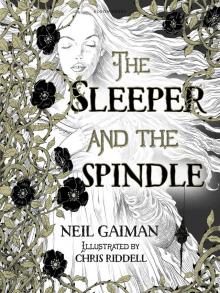 The Sleeper and the Spindle
The Sleeper and the Spindle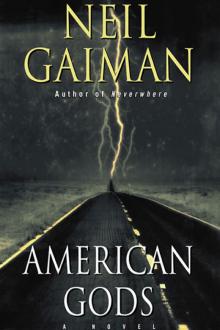 American Gods
American Gods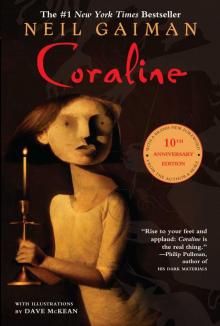 Coraline
Coraline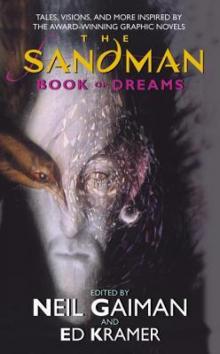 The Sandman: Book of Dreams
The Sandman: Book of Dreams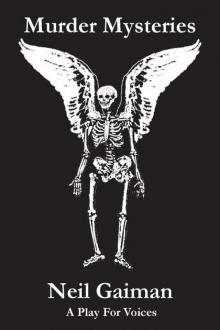 Murder Mysteries
Murder Mysteries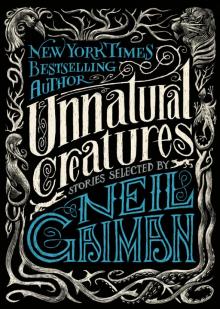 Unnatural Creatures
Unnatural Creatures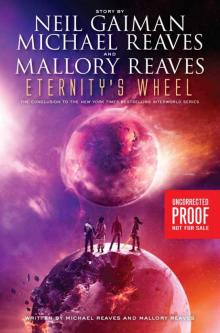 Eternity's Wheel
Eternity's Wheel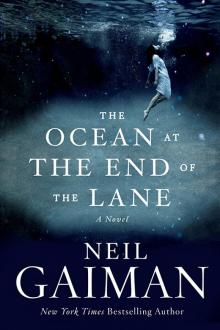 The Ocean at the End of the Lane
The Ocean at the End of the Lane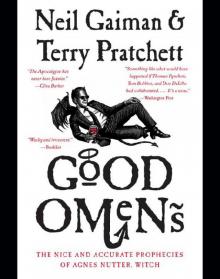 Good Omens
Good Omens Stardust
Stardust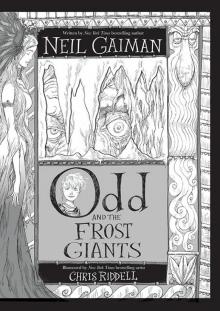 Odd and the Frost Giants
Odd and the Frost Giants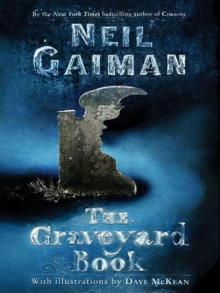 The Graveyard Book
The Graveyard Book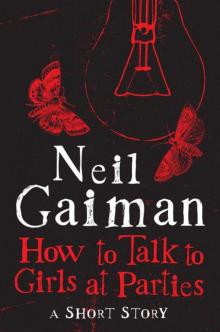 How to Talk to Girls at Parties
How to Talk to Girls at Parties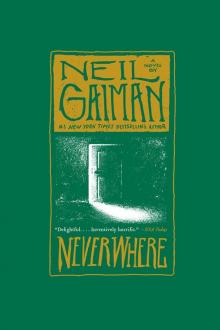 Neverwhere
Neverwhere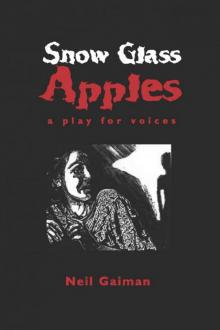 Snow, Glass, Apples
Snow, Glass, Apples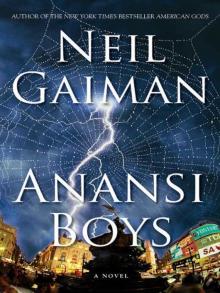 Anansi Boys
Anansi Boys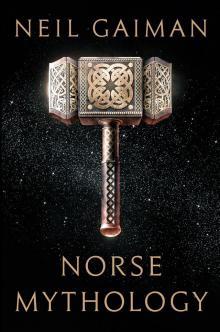 Norse Mythology
Norse Mythology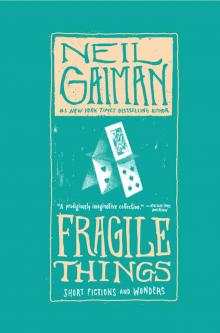 Fragile Things: Short Fictions and Wonders
Fragile Things: Short Fictions and Wonders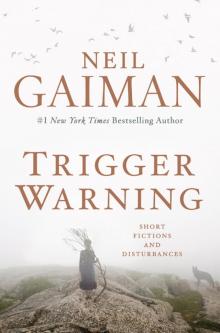 Trigger Warning: Short Fictions and Disturbances
Trigger Warning: Short Fictions and Disturbances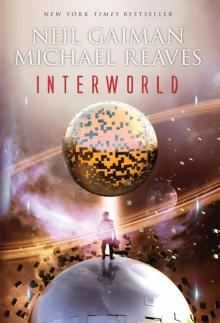 InterWorld
InterWorld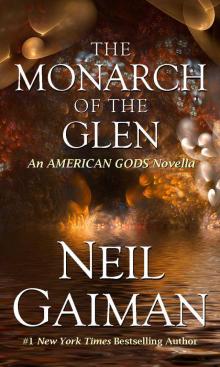 The Monarch of the Glen
The Monarch of the Glen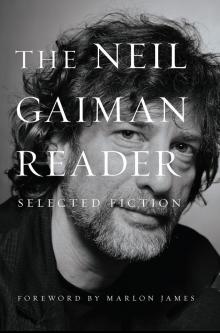 The Neil Gaiman Reader
The Neil Gaiman Reader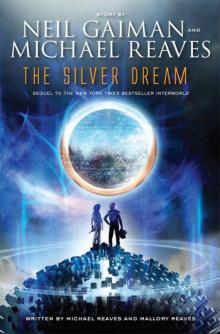 The Silver Dream
The Silver Dream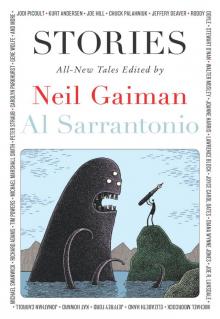 Stories
Stories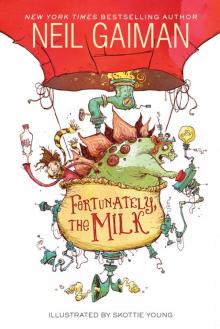 Fortunately, the Milk
Fortunately, the Milk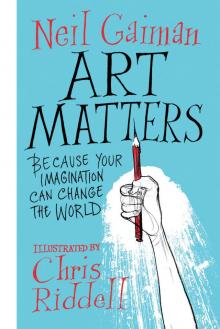 Art Matters
Art Matters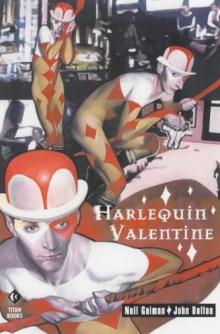 Harlequin Valentine
Harlequin Valentine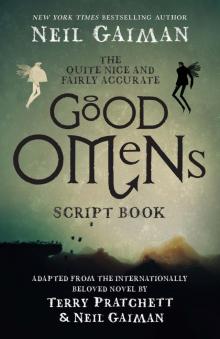 The Quite Nice and Fairly Accurate Good Omens Script Book
The Quite Nice and Fairly Accurate Good Omens Script Book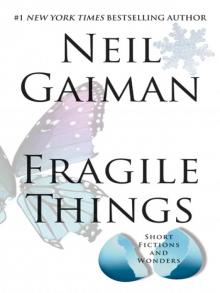 Fragile Things
Fragile Things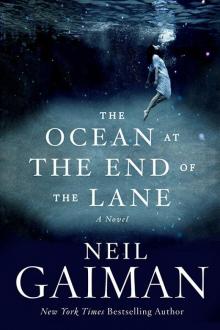 The Ocean at the End of the Lane: A Novel
The Ocean at the End of the Lane: A Novel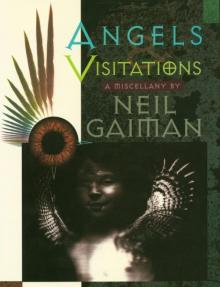 Angels and Visitations
Angels and Visitations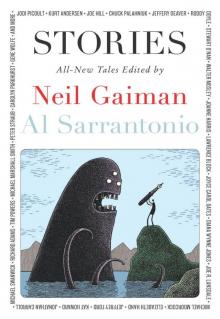 Stories: All-New Tales ngss-1
Stories: All-New Tales ngss-1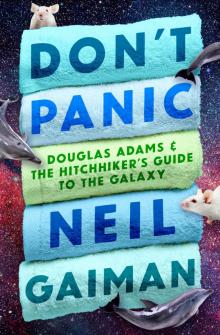 Don't Panic
Don't Panic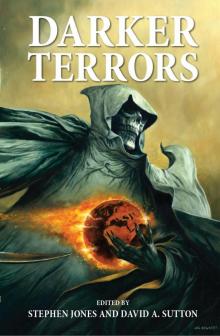 Darker Terrors
Darker Terrors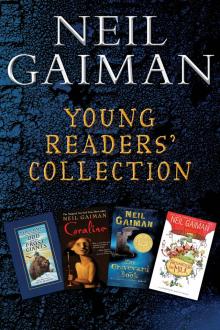 Neil Gaiman Young Readers' Collection
Neil Gaiman Young Readers' Collection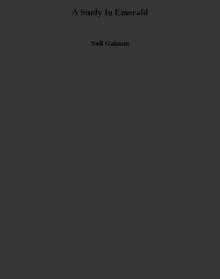 A Study In Emerald
A Study In Emerald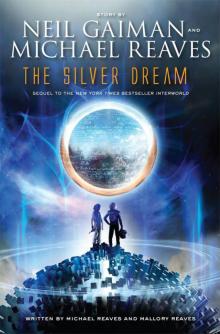 The Silver Dream: An InterWorld Novel
The Silver Dream: An InterWorld Novel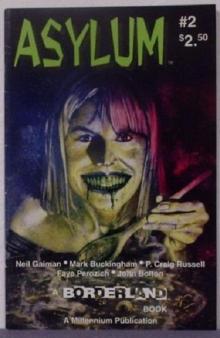 Feeders and Eaters
Feeders and Eaters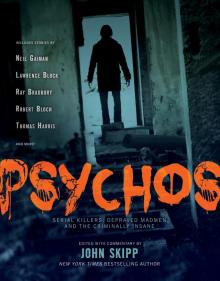 Psychos
Psychos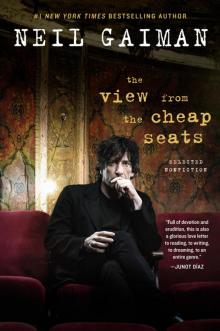 The View from the Cheap Seats
The View from the Cheap Seats Trigger Warning
Trigger Warning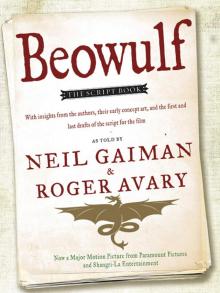 Beowulf
Beowulf Nessun Dove
Nessun Dove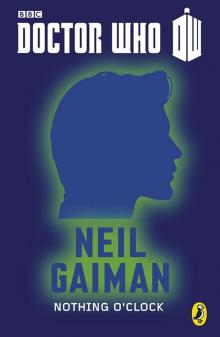 Doctor Who: Nothing O'Clock: Eleventh Doctor: 50th Anniversary
Doctor Who: Nothing O'Clock: Eleventh Doctor: 50th Anniversary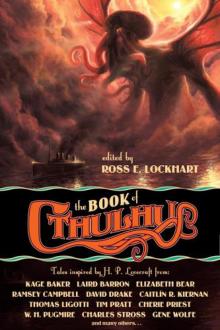 The Book of Cthulhu
The Book of Cthulhu